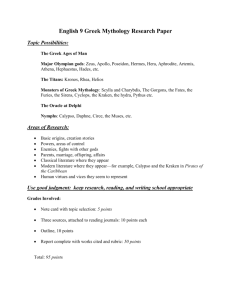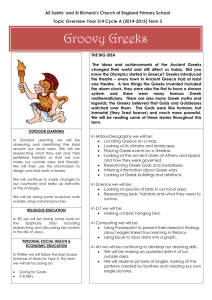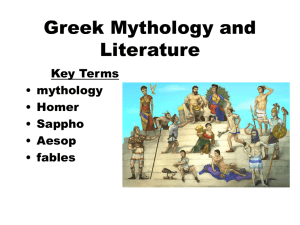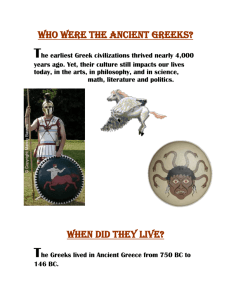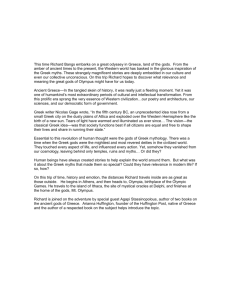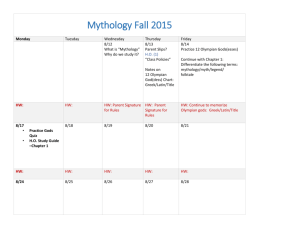Greece Ch 5 Sec 1
advertisement
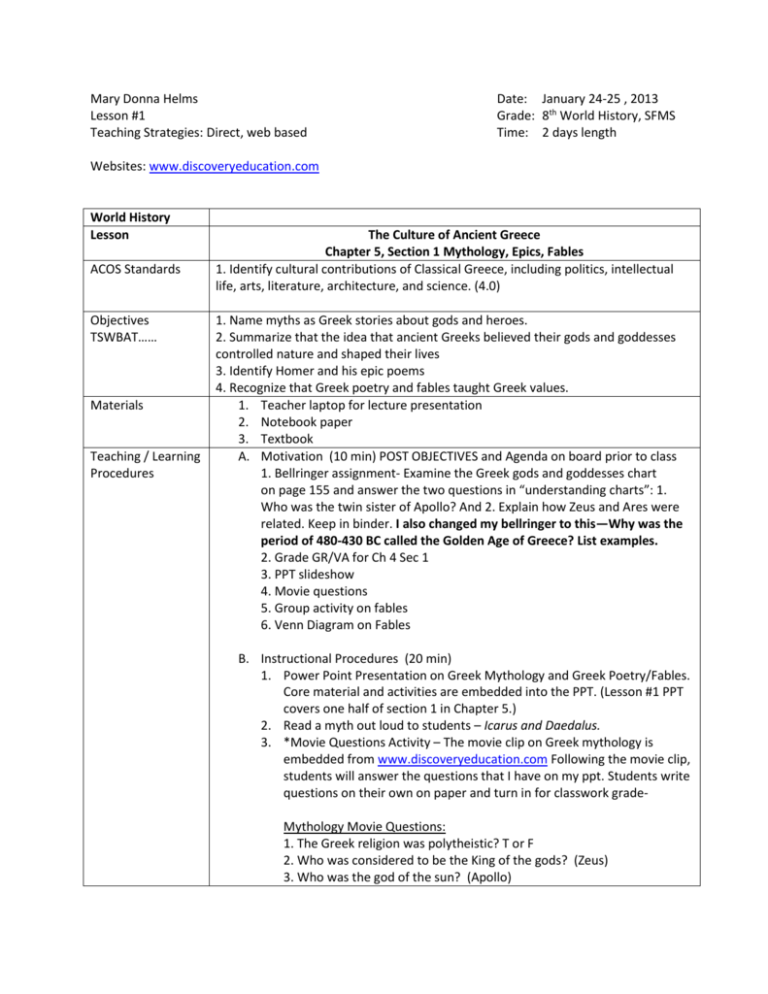
Mary Donna Helms Lesson #1 Teaching Strategies: Direct, web based Date: January 24-25 , 2013 Grade: 8th World History, SFMS Time: 2 days length Websites: www.discoveryeducation.com World History Lesson ACOS Standards Objectives TSWBAT…… Materials Teaching / Learning Procedures The Culture of Ancient Greece Chapter 5, Section 1 Mythology, Epics, Fables 1. Identify cultural contributions of Classical Greece, including politics, intellectual life, arts, literature, architecture, and science. (4.0) 1. Name myths as Greek stories about gods and heroes. 2. Summarize that the idea that ancient Greeks believed their gods and goddesses controlled nature and shaped their lives 3. Identify Homer and his epic poems 4. Recognize that Greek poetry and fables taught Greek values. 1. Teacher laptop for lecture presentation 2. Notebook paper 3. Textbook A. Motivation (10 min) POST OBJECTIVES and Agenda on board prior to class 1. Bellringer assignment- Examine the Greek gods and goddesses chart on page 155 and answer the two questions in “understanding charts”: 1. Who was the twin sister of Apollo? And 2. Explain how Zeus and Ares were related. Keep in binder. I also changed my bellringer to this—Why was the period of 480-430 BC called the Golden Age of Greece? List examples. 2. Grade GR/VA for Ch 4 Sec 1 3. PPT slideshow 4. Movie questions 5. Group activity on fables 6. Venn Diagram on Fables B. Instructional Procedures (20 min) 1. Power Point Presentation on Greek Mythology and Greek Poetry/Fables. Core material and activities are embedded into the PPT. (Lesson #1 PPT covers one half of section 1 in Chapter 5.) 2. Read a myth out loud to students – Icarus and Daedalus. 3. *Movie Questions Activity – The movie clip on Greek mythology is embedded from www.discoveryeducation.com Following the movie clip, students will answer the questions that I have on my ppt. Students write questions on their own on paper and turn in for classwork gradeMythology Movie Questions: 1. The Greek religion was polytheistic? T or F 2. Who was considered to be the King of the gods? (Zeus) 3. Who was the god of the sun? (Apollo) 4. Who was the goddess of the hunt? (Artemis) 5. Who was the goddess-protector of Athens and what was the name of the temple dedicated to her? (Athena, Parthenon) 6. Who was Poseidon? (god of the sea) 7. Where did the gods live? (Mt. Olympus) 8. What did the Greeks consider to be their most important buildings within their cities? Why? (temples, b/c they were a dwelling place of the gods) 9. Why did the Greeks have rituals and festivals for their gods and goddesses? (to seek their honor, favor) 10. What is an Oracle? (a priestess who predicts the future) Discussion questions after the movie: 1. Do we participate in rituals today? 2. Did the ancient Greeks believe in an afterlife? Where did souls go? 3. What other ancient civilizations that we have studied believed in an afterlife? 4. Literature: Epics and Fables Essential Intro Questions to ask : (please see ppt which is attached) - Has Greece civilization had an important impact on our world? - Why did Greeks create myths? To explain their lives, nature, things that happen in life -Are references to Greek gods in modern day literature? - Were epics typically written down or told out loud? Why was this? - Why were epics important to the Greeks? Are examples of Greek epics with us today? -Who was Aesop and what did he do? What are the characteristics of a fable? Activity – Break into groups and have students read the bio of Homer on pg. 159 and a pre-selection of Aesop’s Fables. Students will evaluate what the fable is trying to tell us and then each group will present their assigned fable and its meaning to the class. Choices are The Fox and the Grapes, (someone having sour grapes), The Tortoise and the Hare (slow and steady wins the race), The Wolf in Sheep’s Clothing (appearances are deceptive), The Shepard and The Wolf (there is no believing a liar), The Ant and the Grasshopper (be prepared for hard times) 5. As a class, we will complete Venn Diagram on the Smartboard (Epic)(both)-(Fable). Students will copy Venn Diagram on their paper and turn in for a classwork grade. Assessment / Evaluation Objective 1: Formative-Ask questions throughout PPT lecture getting students to identify terms. Summative: These terms/facts to appear on weekly quiz and unit test. Objective 2: Formative- During PPT, ask students questions listed in teaching strategies. Summative -Students must identify on quiz. Objective 3: Formative- Gauge student learning by their responses to my questions Summative: Students must identify Homer and the Odyssey on test. Objective 4: Formative- Evaluate learning through the discussion. SummativeCompletion of Venn Diagram. Supplemental 1. Students my use the classroom computers to access Activities http://greece.mrdonn.org/greekgods/pandora.html to read other selections of myths or they may use the available classroom books to read myths. Accommodations For those students that need extra help with the content material, I can give them a filled out guided reading sheet so they may check their answers and be available for questions before or after class. I will also walk around during group time to assist those students who need it. For students absent Read section 1 of chapter 5 Complete Section 1 GR/VA Give students a copy of the movie questions and Venn diagram. Complete Greek God Understanding charts- answer two questions, pg 155 Reflection 1. Were objectives met? - I framed my lesson around the textbook material and the ACOS so I feel that my lesson met the stated objectives. 2. Were students engaged? Yes! They loved hearing about mythology and loved doing the Aesop’s fables group activity. I wanted them to read and participate in deciphering the fables and I think they enjoyed doing so. I would say that the students were very active in the questioning process. 3. Did I alter my plan? -Yes- I over planned way to much material but I would rather have too much than not enough. So, I had to delete items that were not as important to cover because time was running short. I deleted reading Icarus and Daedalus as well as the Venn diagram activity. Time was the main concern here. I also changed my bellringer to this—Why was the period of 480-430 BC called the Golden Age of Greece? List examples. 4. Did I provide accommodations? I went around the room to those students that needed extras assistance to make sure they were on task on with the rest of the class. I assisted those during the group activity that could not read well and explained the fables to them in their own, modern words. 5. What other support, resources could I have used? -I would have liked to have read them Icarus and Daedalus or Pandora’s Box but the time was not long enough. I think exposing them to these great stories would be beneficial. Most of them did not know any Greek myths. 6. Would I teach the lesson the same? -I may take two days to cover myths, epics and fables because there is a wealth of information to tell the students and they enjoy hearing these stories. I liked the group activity because it broke up the monotony of hearing a teacher talk about ppt slides. The students enjoyed the interaction and asked a lot of questions. I would probably lengthen the unit on Greece so I could focus on what they are interested in (mythology) and try and not get through it in as short a time.
